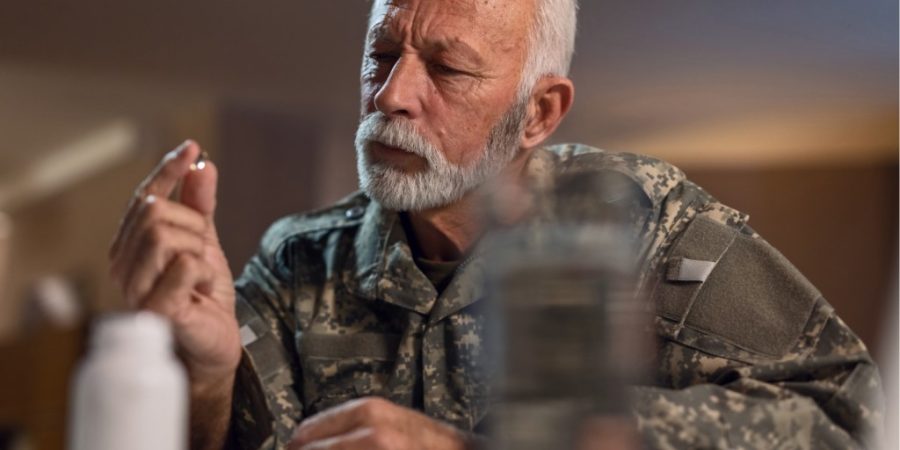
While there is rightly a lot of attention paid to veteran PTSD statistics, drug and alcohol addiction rates among veterans go comparatively ignored. But not talking about drug and alcohol abuse in military personnel only creates additional hurdles in accessing addiction treatment. And that’s a problem, because 10% of veterans returning from Iraq and Afghanistan face substance abuse issues.
Today, we’re going to discuss the different types of substance abuse that affect veterans. By spreading information about how common an issue this is, we hope to remove the stigma from veterans asking for help.
Table of Contents
PTSD and Addiction
There has long been an understood connection between substance abuse and mental health, but this is especially true for veterans. The primary reason for high addiction rates among veterans is post-traumatic stress. Particularly for combat exposed veterans, service-related events like violence, death, and military sexual trauma can lead to PTSD. But how does that work?
PTSD can make it impossible to move past a traumatic event. Common symptoms of PTSD include:
- Insomnia
- Flashbacks
- Avoiding situations that are even vaguely similar to the traumatic event
- Aggression
- Difficulty concentrating
When faced with all of these issues, it’s normal for relationships to suffer. For military veterans, it’s easy to feel like the only option left is to abuse drugs or alcohol. In fact, according to the U.S. Department of Veterans Affairs, two out of 10 veterans with PTSD also have a substance use disorder. Unfortunately, this issue becomes even more likely as veterans receive treatment for physical and mental injuries sustained during their service.
Prescription Drug Abuse


Among veterans who face combat exposure, being injured is unfortunately not that uncommon. In fact, one out of ten veterans has been injured in the line of duty. Not only are these individuals more likely to suffer from PTSD, but they are also more likely to be prescribed medications to address mental and physical injuries.
These pain medications come in a variety of forms, but many of them are addictive. Some of the most common prescriptions for veterans are:
- Opioid painkillers like Vicodin or OxyContin
- Benzodiazepines like Xanax or Valium
- Sedatives like Ambien
Among people who were once active duty service members, these medications can pose a danger, even when prescribed correctly. This is because all of these medications are habit-forming, and as veterans develop tolerances, they often need more and more of these drugs to get the same effects.
Sometimes, veterans will “doctor shop” to find health care professionals who will prescribe them higher dosages of medications. Of course, if this doesn’t work, the addiction does not stop there. Instead, veterans may feel compelled to switch to another substance to numb the mental and physical pain that they experience.
Opioid Addiction
When people cannot get the prescription opioids that they’re dependent on, they may turn instead to opioids like heroin. With the black market, there is no limit on how the opioids a person can buy, which is what makes it so appealing for people suffering from substance use disorders.
Unfortunately, this can be even more dangerous than abusing prescription medications. First, heroin can do long-term damage to a veteran’s body, but this is not the only risk with heroin abuse. In many cases, individuals have overdosed because they did not realize how strong their heroin was or that it contained additives like fentanyl.
Prescription opioid abuse and heroin addiction pose serious risks to military personnel, but they are not the sole cause of addiction rates among veterans. In some cases, veterans choose to avoid seeing a doctor at all for their physical and invisible wounds of war. In these situations, they are much more likely to rely on alcohol as a coping tool.
Alcohol Addiction


When people struggle to readjust after their military service, alcohol can seem like an easy way to self-medicate. It can lessen anxiety that stems from PTSD, and going to bars is an easy way to engage with people. However, there are serious issues that arise when a veteran drinks alcohol to cope with underlying mental health issues.
Often, veterans will binge drink when their physical injuries or post-traumatic stress become especially bad. As time goes on, binge drinking will likely become more frequent, until drinking alcohol becomes the standard for that individual. Not only does this alcohol abuse seriously affect the health of livers and brains, but it poses serious mental health issues.
Alcoholism can only worsen a veteran’s quality of life. Where before they had to deal with PTSD and other wounds of war, they now have those same problems as well as an alcohol addiction. And as the addiction worsens, their PTSD symptoms will do the same due to the chaotic and unpredictable life that comes with addiction.
Veteran Addiction Rates Can Decrease
All of these factors play considerable roles in the addiction rates of veterans. But the good news is that this situation can be changed. With proven, veteran-focused treatments like cognitive behavioral therapy, group therapy, and other forms of substance abuse treatment, veterans can recover.
Heroes’ Mile is a veteran-specific drug and alcohol rehab in DeLand, Florida, where we offer treatments from detox to intensive outpatient programming. If you have any questions about our treatment options, call our admissions specialists at 888-838-6692 or submit your questions through our digital contact form. Remember, you’re not alone in this fight. We’ve got your six!
The post The Truth of Addiction Rates Among Veterans appeared first on Heroes’ Mile Veterans Recovery Center.
Source
Original Author: Heroes’ Mile

